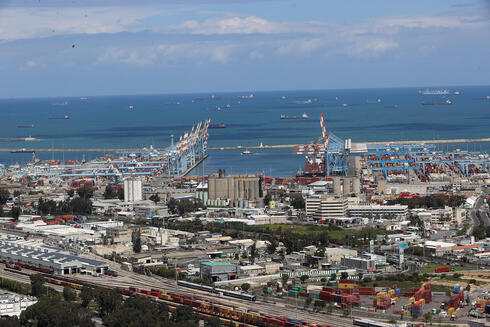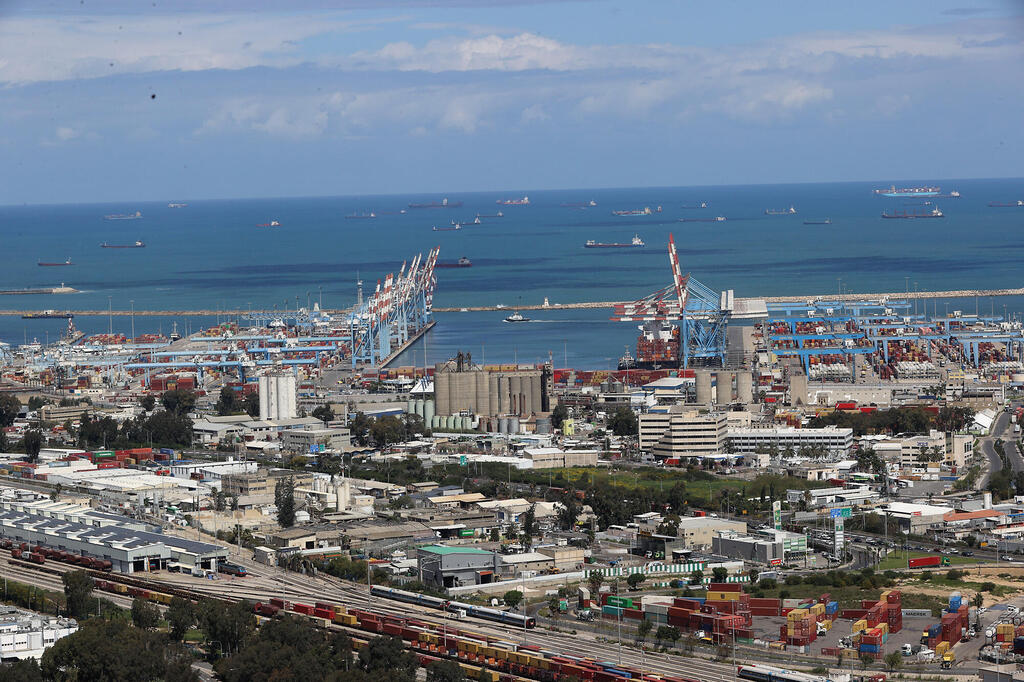
Hezbollah missiles threaten Adani's Haifa Port: What happens if Israel’s key trade hub shuts down?
As missile attacks escalate, the potential closure of Haifa’s Adani-owned port puts immense strain on Israel’s logistics and economy.
This week's missile attacks on Haifa illustrates just how explosive the situation is. While it’s true that Israel's defense systems are prepared and on high alert, as the IDF repeatedly emphasizes, and as we see in the field, there is no hermetic protection. In the latest attack, missiles struck Kiryat Yam and Kiryat Motzkin. Continued heavy attacks by Hezbollah could lead to missiles landing in or near one of Haifa's ports.
There is a broad consensus within the industry regarding the immediate impact such an incident would have: ship movement would halt, and vessels would divert to unloading at the ports in Ashdod and southern Israel. A similar scenario occurred in 2006 during the Second Lebanon War when a missile hit the railway garage near Haifa Port, killing eight workers. That disaster led to the closure of Haifa Port and the redirection of shipping activity to Ashdod, which was reinforced with ferries from Haifa.
The result of that shift is not remembered fondly, as shown in a 2009 study by the National Security College Research Center in collaboration with the University of Haifa. The study noted that the state was unprepared for such a scenario: "The near-complete paralysis of Haifa Port during the war clearly demonstrated Ashdod Port’s inability to serve as an alternative in an emergency. Ashdod Port struggled with the burden of Israel’s maritime trade, and no advance preparations were made, neither in terms of infrastructure nor in the regulations and procedures required to handle such a situation."
Alongside the potential paralysis of Haifa Port, an opposite scenario unfolded at the start of the current war in Gaza, where activity was redirected primarily from the ports of Eilat and Ashdod to Haifa.
The Port of Haifa is owned by a consortium led by India's Adani Group, which paid around $1.15 billion for it last year. Israel has been selling its state-owned ports and building new private docks in recent years in an effort to bring down costs and cut above-average waiting times for vessels to unload. China's Shanghai International Port Group (SIPG) opened a new port across the bay in Haifa in 2022.
The Italians have already changed course
The current situation is among the most complex the country has faced in terms of port operations, raising serious concerns about their ability to continue unloading goods, including vital supplies, in extreme scenarios. So far, and unlike the aviation industry, where most foreign airlines have canceled routes to Israel, the shipping industry has seen few cancellations, and companies continue to arrive. However, both the Shipping Bureau and the Administration of Shipping and Ports confirm that since the war began, efforts have been made to reassure shipping companies and convince them to maintain their routes to Israel.
Aside from negotiations with shipping companies, there is concern that the seamen—crews on the ships—may refuse to dock in Israel, even if the shipping companies wish to continue. For this reason, Israeli representatives board every ship before it enters port to provide written and oral safety instructions.
The Ministry of Transportation also issued a circular outlining defense mechanisms and attempting to maintain a sense of business as usual. To further alleviate concerns among shipping company owners, Israel expanded property tax exemptions to include foreign ships docking in the country. Meanwhile, sources in the industry report that operations continue, though the security situation is impacting business. For example, foreign passenger ships have ceased visiting Israel and are unlikely to return in 2025. Mano, the Israeli cruise company that used to operate out of Haifa, shifted its operations to Ashdod about two weeks ago at the directive of the National Emergency Management Authority. Additionally, the Italian Coast Guard instructed Italian shipping companies not to visit Haifa Port, which has impacted shipping giant Grimaldi’s fleet, now unloading in Ashdod.
The most likely scenario: Haifa Port closure
The most tangible concern is damage to Haifa Port, resulting in its closure. Although the current infrastructure is different from 2006, importers fear that in such a scenario, the import of goods to Israel will be severely affected. "One missile in the shipping area, and no ship will come. No ship owner will risk sending a vessel into a missile-hit area, nor can they be forced to do so. The bill of lading allows them to unload goods at another country’s port," says Itai Ron, chairman of the Grain Importers Union and CEO of Zenziper.
In such a scenario, all activity at Haifa’s three ports would shift to Ashdod, which already struggles with handling its regular load, and to the nearby Southern Port, which only handles containers. "For containers, there’s no issue, as the Southern Port and Ashdod can manage the load. Worst case, delivery might be delayed by a day or two. If you order from AliExpress, it will arrive. But for food imports, it’s different. Ashdod Port’s facilities are good, but they lack sufficient staff to handle the increased demand," explains Ron. For instance, he notes, "A corn ship that arrived on September 13 only finished unloading last week, whereas in Haifa, it takes three days. Another ship took over 40 days to unload, compared to just 10 days in Haifa. Ashdod provides one crew per day, but five to six are needed, and delays occur because the platform isn’t clear."
Looking at the numbers, Ashdod Port would need to at least double its capacity for most types of goods, and for some goods, the volume would need to increase three to four times. Marine Traffic, a website that tracks ships in real-time, showed yesterday that 12 ships were waiting outside Ashdod, compared to just six outside Haifa. Yoram Zeba, president of the Israel Chamber of Shipping, warns that despite Ashdod Port’s efforts, it’s not built to handle the cargo of other ports. "If missile barrages force ships from Haifa to Ashdod, we’ll face an unbearable situation, with dozens of ships waiting outside Ashdod, or being diverted to nearby ports in other countries, as permitted by the bill of lading."
Ashdod Port acknowledges that in such a scenario, it will have to prioritize cargo. "Recruiting additional workers will help address the manpower shortage, but Ashdod Port cannot be built to handle peak loads alone. We must operate based on operational priorities. All essential goods will receive priority, and there will be no shortage," says Shaul Schneider, Chairman of Ashdod Port.
The Ministry of Transportation, under Zadok Redker, oversees the preparation of all ports. "No port can grow by 100%, but there are plans to transfer workers from Haifa to Ashdod, and we’ve already conducted a drill to practice this. This will help close the gaps and maintain port operations, especially for those called to reserves," Redker explains. In terms of prioritizing goods, the National Emergency Management Authority is responsible for determining which cargo is essential, and they will manage the prioritization process if necessary. "We will try to bring in everything we can, but some goods, like vehicles, may be redirected to Eilat, or even urgent containers could go there in limited quantities."
Plan to restore Israel’s merchant fleet
In late September, the Administration of Shipping and Ports issued an order limiting vehicle storage at all ports to make space for more essential goods in case of emergency. The directive set vehicle storage limits at 15,000 for Ashdod Port, 15,000 for Haifa Port, and 4,000 for the Gulf Port operated by the Chinese SIPG company.
The Israel Defense Forces are also preparing for more extreme scenarios. "If 70% of foreign companies announce they’re stopping shipments to Israel, an emergency plan will be activated to unload goods at nearby ports and transport them to Israel using the few remaining seamen," says Redker. In the long term, there is also a plan to rebuild Israel’s merchant fleet. "Today, we have very few Israeli officers. We’ve developed a plan that can restore the situation and bring back an independent Israeli merchant fleet, similar to what existed in the past."















